Iraqi Kurdistan’s Newroz Telecom: Exclusive Interview About Projects, Government and other Issues
Newroz group is a regional telecom group. When Newroz Telecom began their operation in 2005 the internet penetration rate was almost zero. Newroz Telecom was the first company to interconnect Iraq around the world and replace the old connections. Following the recent negative experience in Iraq, Newroz Telecom is now focusing on Kurdistan only. The company plans to deploy 4G (LTE) all over the Kurdistan region of Iraq.
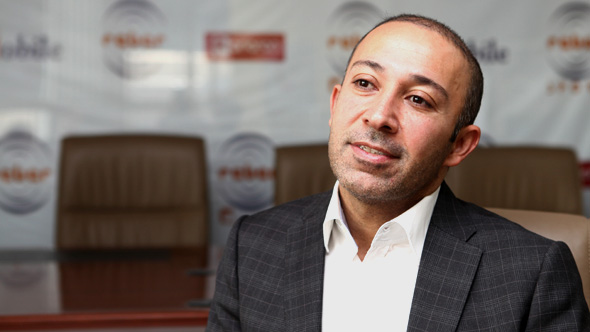
Can you please describe the ownership structure of Newroz Telecom?
The company was established in 2005. At that time, we spoke to the Prime Minister about building the telecom infrastructure in Kurdistan. It was difficult at that time because the government had a monopoly in every sector including telecom. So we approached them with the idea of partnering with the Ministry of Telecom and using their infrastructure. They did not have fiber optic and all the exchanges were very old. So we would be partners – us having about 70% and them having 30% with some other investors with a minority share. We agreed to a 20 year contract with the Kurdistan Regional Government (KRG) and the Ministry of Telecom in particular.
We have signed the contract under the investment law legislation in Kurdistan which is very attractive and we started to build things that Kurdistan didn’t have. At the time, the penetration rate of the internet was almost zero so we tried to concentrate on the internet sector instead of voice; the other operators tried to get licenses for mobile (Korek Telecom or Asiacell). We tried first to build this infrastructure; at the time it was very expensive and there was no guarantee on the return on investment but we tried because we always believe in the future. We laid about 3,000 km of fiber, not only covering and connecting the main cities, but also small cities and villages. We had started in 2006 and by the end of 2007 we were finished.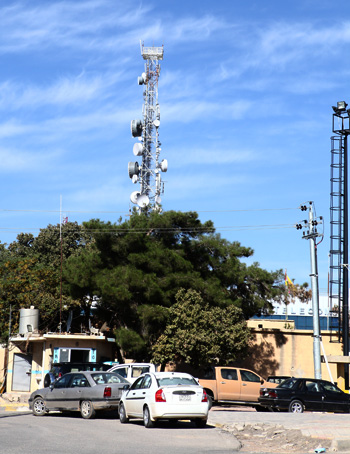
We also changed and replaced all the old exchanges which were imported from Iran and other places. They weren’t very good and we couldn’t offer our subscribers very good quality or service, so we had to change them. So for the first time in the region, in 2007, we brought fiber to the curb. It wasn’t to the home at that time but to the curb. So we changed the existing copper network and replaced it with fiber. The customers knew about the differences between copper and fiber.
We had another big challenge at the same time, which was connecting with the outside world. For fiber, you have to be connected to the internet around the world and the only place for us to connect to was Turkey. In 2007 and 2008, they had some political tensions with Kurds. We tried our best with the help of our partners and we managed to make it work. At that time, the Turkish government tried to change their policies and we managed to make this connection. We were the first company to interconnect Iraq around the world and replace these connections. They used to have very expensive connections with very bad quality. We were the first company even before the Iraqi government – they were a monopoly, so they tried to prevent that connection. They even tried to stop it politically by speaking to the Turkish government but the Turkish really supported their company, Turk Telecom, and we were able to make a deal with Turk Telecom to complete the connection.
That was a turning point in the history of the Iraqi telecom because until that moment, everything was a monopoly, including in Kurdistan. Unfortunately in Iraq, this is still the case. Based on that connection, there was a huge discount on the bandwidth given to companies and subscribers at that time. 1 Mb previously cost more than US $1,400 and now it only cost US $20. Without that interconnection, it would not have been possible. If you’re in Iraq, 1 Mb is still US $1,200 – this is the most expensive rate in the world, more expensive than Cuba, and perhaps very few people know that. It is because in Iraq they still have a monopoly and they don’t allow any private sector company to make deals with neighboring countries, including connecting to Kurdistan. They are very strict about that and the internet penetration is only 2%. Even Bahrain has more internet subscribers than the Iraq. If you see internationally that the internet penetration of Iraq is 8%, it’s only because of Kurdistan. We just reached 10% and our goal is to reach 35% and probably 50% by the end of 2015.
1 Mb previously cost more than US $1,400 in Kurdistan and now it only cost US $20. Without that interconnection with Turkey, it would not have been possible. If you’re in Iraq, 1 Mb is still US $1,200 – this is the most expensive rate in the world, more expensive than Cuba…
So this is what we accomplished in the first years of Newroz Telecom. Then we tried to improve on the service that we had. We tried to build on the fiber we had laid and went into wireless as well because some areas of Kurdistan are geographically difficult to reach by fiber. Our goal in 2009 was to cover the whole of Kurdistan, not only the main cities, because we wanted all residents of Kurdistan to benefit from this service. As you know, the internet is very important and now is one of the services that no one wants to lose. A recent study in Europe showed that if people have economic problems, the service they least want to lose is the internet. Young people could give up their cars but will not give up their broadband. So we tried to cover the whole of Kurdistan and it was with 2.5G at the time. The application and the internet and the demand were increasing daily. So we always tried to increase our capacity and offer new technologies and greater bandwidth to our subscribers. We thought about 3G and after a very long study, we decided it was not worthwhile to pursue 3G as long as 4G was coming. So we scrapped the idea of 3G and went for 4G.
For a private entity like you, how difficult is it to operate in an environment where politics sometimes gets in the way of private initiatives?
There are two things that influence this. One is the government mentality; we inherited a government that was a monopoly during the time of Saddam and Kurdistan was part of Iraq. So the government and the employees working for the government shared the same mentality and they kept doing the same things. It is so difficult to try to get them to do things differently and in our case to be a partner with the government and try to work with them. It takes time to change this type of mentality.
The other challenge is the government and how to deal with them and draft a contract with them. Because they are the government, they always want to have all the rights and so drafting the contract was challenging. 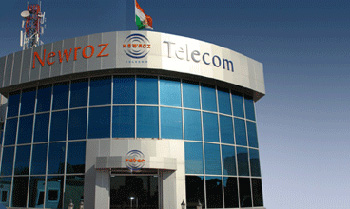 It is better in Kurdistan now. If you look at the differences which have happened since 2005, there are huge changes. Now, they view the private sector as an extremely important part of improving the country’s economy. In Iraq it is not the same and things are going backwards. Even if they have some private sector businesses, they look at it as a threat to the government and they try to monopolize everything again. Even during the time of Saddam, there were some private companies. They belonged to the government but there were still some responsibilities and decision making with the private companies. Now they are trying to abolish all of that and bring it all back under the control of the government.
It is better in Kurdistan now. If you look at the differences which have happened since 2005, there are huge changes. Now, they view the private sector as an extremely important part of improving the country’s economy. In Iraq it is not the same and things are going backwards. Even if they have some private sector businesses, they look at it as a threat to the government and they try to monopolize everything again. Even during the time of Saddam, there were some private companies. They belonged to the government but there were still some responsibilities and decision making with the private companies. Now they are trying to abolish all of that and bring it all back under the control of the government.
The difference is that Kurdistan is moving towards privatization and Iraq is moving towards bringing everything under the control of the government. I don’t believe that in Iraq there will be big companies coming in to make investments under their current policies but it is very open in Kurdistan. In 2005 it was difficult and it became easier from 2007 to 2009. I travel a lot to neighboring countries including Turkey, and I believe we in Kurdistan are not very far behind Turkey right now. The mentality has changed and the government has changed, especially in the way they view the private sector. Now they view the private sector as a partner and I think they are trying to introduce a new law in the minister’s cabinet called the PPP, Private Public Partnership, which is a very good thing. They did the same thing in South Africa and it was very successful. So this is the strategy for the Kurdistan government but I’m not very optimistic regarding Iraq.
Yet when we spoke to Mr. Herish Muharam from the Kurdistan Board of Investment, he told us that the Kurdistan’s Ministry of Communication is sort of redundant because all the executive powers, including licensing, are held by the Central Government. What is your take on that?
I would more blame the Kurdish government, not the Iraqi government, because the constitution of Iraq is very clear and the Ministry of Communication in Kurdistan has so many rights, but maybe they’ve never tried to follow or enforce them. If we examine the constitution of Iraq, it is very clear regarding the telecom sector. The Ministry of Communication here has a right here to many licenses but they never went to that situation; to really go and discuss the licenses with the Iraqi government – though they have a right to do so! Thus I think the Kurdistan’s Ministry of Communication is sort of neglecting some of their rights given to them by the Iraqi constitution.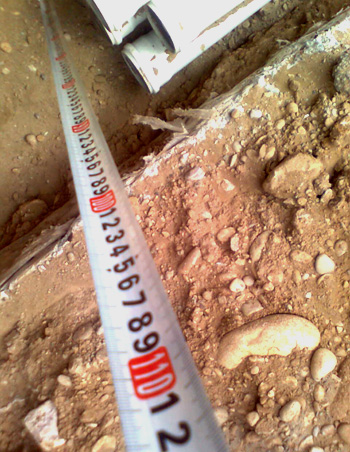
Kurdistan has its own set of challenges which many companies are facing here – the division between the two or three parts or regions. How difficult is it to take legal recourse in case the private company runs into problems?
It was true that until two years ago, you could say it was really divided but now after the last term of Nechirvan Barzani, the new Prime Minister, many changes has been made. I think about 50% of what needs to be done has been already done. He gathered and unified the Ministry of Interior which was not unified; previously they had one in Sulaymaniyah and another in Erbil and Duhok. The Ministry of Finance has also been unified and now any legislation or license issued in Erbil is respected and valid for all of Kurdistan. It is not 100% but it is starting to be recognized everywhere so it is better now and hopefully by 2013 or 2014, that problem will no longer exist. It will be very good for any investor to come and when they invest in Kurdistan, they will be investing in all of Kurdistan. When they have a telecom license here, the license will cover whole Kurdistan not only certain parts.
Let’s talk about the Newroz group. Which companies belong to the Newroz group?
Newroz group is a regional telecom group. We have shares in Newroz Telecom and we have shares in Newroz Tel with which we have a project ongoing in Iraq – you may have heard that we are having some difficulties with that. We also have some other companies, either owned 100% by us or we are a part of it. So Newroz is one company we are a shareholder in.
What about your strategy? You mentioned you were going to deploy 4G.
Yes, we have a very good strategy that will not only benefit us but also Kurdistan and the whole of Iraq. The strategy was first of all to make Iraq the bridge between the Far East and Europe and America because everybody knows all these (submarine) cables go through the Suez Canal in Egypt. There are big concerns amongst companies throughout the world and they want to find an alternative road. The alternative road that we have been working on for the past two or three years is Iraq. This is not only because it is shorter which in telecom means less latency. For new applications such as 3D TV, the big operators aren’t concerned with the price, they are concerned with latency; therefore, better latency is always chosen over a better price.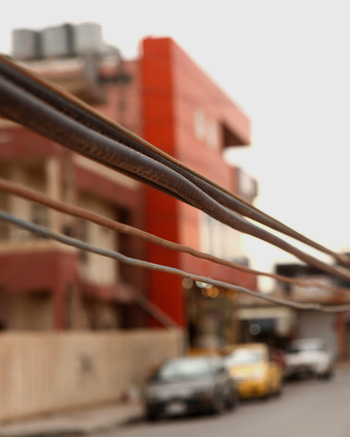
We thought Iraq was the ideal place to compete with the Suez Canal. We tried to do this and we had much help from the Minister of Telecom in Iraq, Mr. Muhammed Tofiq Allawi. He was a great person and we tried to explain all of the benefits to him. He believed in the idea and gave us a license to do this. We did this as an investment and gave a very good share of the total revenue to the Iraqi government. They agreed to it at that time and we went through all the legal channels after more than a year of discussion and negotiation. They signed it and we completed 80% of this project but unfortunately, the Prime Minister of Iraq has cancelled the project on the bases of security concerns. We have been stuck in this situation for the last six months and no one is giving us any information.
We feel we have been treated very badly by the Iraqi government. We have been accused of some things that are completely untrue. They have not been willing to talk to us directly. We have been trying for the last six months to see the Prime Minister or even send him a letter. But he is not allowing a company to come here to invest under the investment law of Iraq; already we have invested more than US $137 million and finished 80% of the project. Now our project is sitting there and everything can be damaged within the next 6 months and we will have nothing. Even if you go to the court against the Iraqi government or the Prime Minister, he could delay us in the courts for the next 10 years. So we are really facing a very difficult situation right now.
The idea was to change Iraq and the telecom map of the region. It was a huge opportunity for us but unfortunately, the Prime Minister doesn’t have this economic knowledge and he doesn’t want to listen , he’s just losing it.
Also economically, Iraq would be getting a large share of the profits.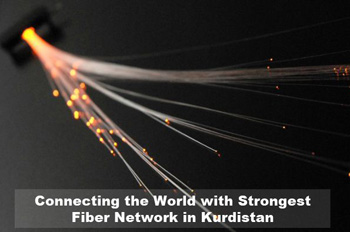
Exactly! Not only economically but also Iraq will be on the map. We had the idea to have a hub in Baghdad; they would be recognized like Frankfurt, London, Marseilles and New York. It would have been an exchange for data in Iraq so companies in Saudi Arabia, Iran, Far East would not go all the way to buy IP’s from London and Frankfurt. They would have bought it from Iraq. It would have been a very good image for Iraq but unfortunately we don’t even have a chance to explain this idea to anybody and even if we explain it, they don’t understand because they don’t have the business knowledge.
What other projects are you working on?
We are trying to put on hold all of our projects going towards Iraq right now and we are concentrating ourselves on Kurdistan. I believe 4G will change a lot in Kurdistan. We are trying to deploy 4G (LTE) in all of Kurdistan, not only in the main cities. This technology has been deployed in some European countries, in rural areas of Germany and in the USA but they have different frequencies than us. In the USA there was the first commercial launch in the world. We are only one or one and a half years behind the USA and we are in line with the UAE and Saudi Arabia. But if you compare the network we have, and according to the vendor which is Alcatel-Lucent, it’s much more advanced than that which was deployed in Saudi Arabia and the UAE. So we have some good ideas based on our experience in this sector. We never started as a 2G and a mobile company; we started as a data company. So we gathered all this experience and now we are trying to implement it and deploy this service to the benefit of all of our subscribers.
We hope that in Kurdistan in the near future, we will have a better infrastructure than what they have in the UAE, Kuwait and Saudi Arabia. No one would have believed that possible five years ago but it is the reality now. In 2013, we will have the best service in the region. This 4G service has so many benefits. Before, for a big capacity with broadband internet you always needed a wire which we already have. But now we want wireless broadband – you can download movies and media companies can benefit from it by broadcasting without any other expensive tools. With one SIM card on the camera, they can broadcast live wherever they are and have the coverage. The government can benefit with monitoring cameras, the police and everything. So it will really change a lot in the Kurdistan region.
If the users have a good internet connection, then I believe that the voice companies can lose 50% on the voice as well because people will use Skype and Viber, and every day there is a new application to make it easier. My idea is that by the end of 2014 there will be no voice, so any company that has a 2G license will either have to upgrade to 3G or 4G or they will just die.
You spent US $137 million in Iraq. For a company of your size, this is disastrous. Where is the cash flow coming from and how are you managing this challenge?
We already contributed this cash and we have investors as well. But if you look at the business itself, yes, we’ve spent US $137 million but the size of the business was huge and if they would allow us to continue this work and do the interconnection, the company would immediately go over US $3 billion. This is because of all the consideration we get from all the big players in telecom all around the world; they are not just looking at us, they are looking for this road to connect to Europe. It’s not just for us, this is a benefit to all of those around the world. So even after the change of the President in Egypt, it was really affected. Now with the new government they will have new rules and they don’t have the redundancy because all of the cables go in the same place so there is no need for new cuts. And this is the bridge between the Far East and Europe. Since 80% of the content comes from Europe and USA there is always a huge demand for this interconnection. So it’s not only our project, it’s their project, too. This project, if it was to start now, it’s a 15 year contract and with the business plan that we have it’s worth more than US $3 billion. So it was really worth it to spend US $157 million and to complete the project we needed to spend more than US $200 million dollars.
Please give us some facts and figures about the telecom and internet sector in Kurdistan. What is the potential for growth for this sector in Kurdistan?
If you look at Iraq and globally, you will see they have an 8% penetration rate, but Kurdistan has 7% and Iraq has 1%. The penetration rate of the internet in Iraq is very low because they don’t allow any private sector companies to operate or build any infrastructure in Iraq. The government unfortunately cannot do it, it has been like this for the last eight to ten years and I believe this could continue for another five years because it is so difficult. In Kurdistan, by the end of 2013, I believe we could reach a 35% penetration rate and by the end of 2015, we could reach over 50% which is very good. When we started in 2005 there was a zero penetration rate. Now 85% of the internet of Kurdistan comes through Newroz, so for a country like Kurdistan, 50% by the end of 2015 is very healthy. I cannot predict anything for Iraq because it has been there like this for ages.
What are the percentages of revenue growth for the sector?
If you compare it to two or three years ago, an ISP or data company versus a 2G mobile company, the 2G always had the upper hand because the voice application was always the most popular. But this is changing and the new application of the internet changed everything, let’s take for example the WhatsApp or Viber applications. WhatsApp is now affecting the voice companies and they are losing revenues on their messages because nobody sends texts anymore – if they have a good internet connection. If the users have a good internet connection, then I believe that the voice companies can lose 50% on the voice as well because people will use Skype and Viber, and every day there is a new application to make it easier. My idea is that by the end of 2014 there will be no voice, so any company that has a 2G license will either have to upgrade to 3G or 4G or they will just die.
This will completely change the landscape and you will get into more direct competition.
Exactly. This is one of the reasons why Newroz is having all these difficulties now. For example what happened to our company in Sulaymaniyah – some people know that you are way ahead of them. Being way ahead of them is something that money cannot solve; the time is very important in this case. When you are ahead of somebody by two or three years, it is so difficult. There are so many means to try to either stop you or halt you. This is happening to us and we just get used to it and deal with it day by day. I think up until now things have gone very well and the schedule is to release the first 4G in the region on March 21, 2013. What Newroz is trying to do is different. It is not only the name of 4G but the service we are trying to provide has never been provided in this whole region, not even in Turkey, the Gulf, or neighboring countries. We could compare our future 4G service to the service available in the United States.